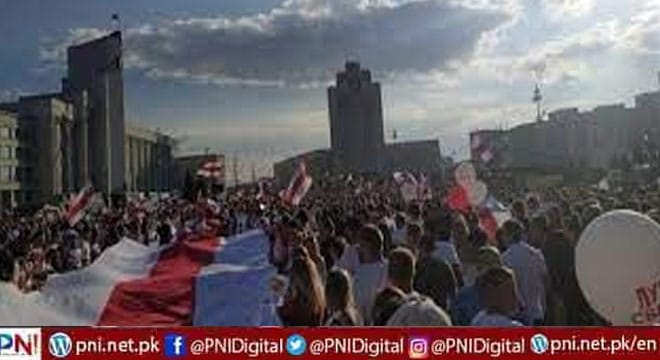Almaty, Kazakhstan, July 22 (AFP/APP): Central Asia’s former Soviet states suddenly look vulnerable to political turmoil despite being ruled for decades by strongmen known for keeping a tight lid on their long-suffering populations.
Since the beginning of the year, protests have turned deadly in three of the region’s five countries, with Kazakhstan — the largest and richest — badly shaken by an uprising sparked by fuel price rises.
In all three, protest has been met with force and communication shutdowns.
But analysts now question whether the region’s authoritarian regimes will be able to continue to rely on repression given the socioeconomic pressure they are under, which has been further increased by fall-out from the war in Ukraine.
Raffaello Pantucci of Britain’s Royal United Services Institute told AFP that “authorities are not as on top of their environments as they project”, while the Economist put Central Asian countries in high risk brackets in a global study last month of potential inflation-related unrest.
Spontaneous demonstrations are effectively illegal in all of the region’s countries bar impoverished Kyrgyzstan.
But even in the most secretive, Turkmenistan, where autocrat Gurbanguly Berdymukhamedov installed his son Serdar as his successor in March, small protests have taken place over food prices, according to media outlets run by dissidents.
– Unprecedented violence –
Bound by shared culture, landlocked geography and a Soviet past, the five majority-Muslim countries are all facing periods of political transition as well as eye-popping inflation.
Kazakhstan saw unprecedented violence at the beginning of the year, leaving 238 people dead and effectively calling time on Nursultan Nazarbayev, whose reign began before independence and who remained hugely influential even after stepping aside in 2019.
In Tajikistan, which launched what it called a “counter-terror operation” in the restive, nominally autonomous region of Gorno-Badakhshan in May, Emomali Rakhmon is widely believed to be readying his son Rustam Emomali for the top job after three decades in power.
In Uzbekistan, reform-touting president Shavkat Mirziyoyev was less than a year into a second term when his government bungled a constitutional reform, sparking protests in the Karakalpakstan region, whose semi-independent status was threatened by now-scrapped amendments to the basic law.
In all of these cases, authorities blamed “external forces” for triggers that were “clearly internal in each case”, said Emil Dzhuraev, a political scientist in Kyrgyzstan, a country that has seen three of its six presidents deposed in crises, the last in 2020.
While governments have arrested perceived ringleaders in post-protest crackdowns, “this offers no explanation for the many thousands with real demands,” Dzhuraev told AFP.
Internet shutdowns and pressure on the independent press have obscured a clear reading of bloody events in the region this year and prompted doubts about official death tolls.
– Boiling over –
Kazakhstan’s crisis remains the most complicated of all to unpack.
The unrest began with peaceful protests over a New Year spike in the cost of a car fuel popular in the energy-rich but poor west of the country.
Mobs and security forces later clashed in the former capital Almaty and several other cities, with government buildings burned and shops looted.
Almaty’s mayor’s office, badly damaged in January, is still covered in netting with a national monument opposite it speckled with bullet holes.
Rising prices remain a threat.
President Kassym-Jomart Tokayev, who blamed January’s unrest on unnamed terrorists and used it to distance himself from his predecessor Nazarbayev, said this month that food inflation was running at over 19 percent for the first half of the year.
Year-on-year economic growth for the same period was just 3.4 percent, he said.
The cost of sugar has jumped around 80 percent in some cities, compounded by a ban on exports imposed by key partner Moscow in response to Western sanctions which triggered frenetic rushes in Kazakh supermarkets.
The sanctions against Moscow, which maintains large military bases in Kyrgyzstan and Tajikistan and vies with China as the region’s top trade partner, are another headache for Central Asian governments.
But while economic and geopolitical factors are working against the Central Asian countries, the absence of freedoms is a more fundamental problem, insisted Marius Fossum, Norwegian Helsinki Committee’s regional representative.
Authorities “typically shut down any and all dissent,” Fossum told AFP.
“Because there are no normal avenues for citizens to channel their frustrations, everything just simmers below the surface until it boils over,” he said.
Follow the PNI Facebook page for the latest news and updates.









